Who buys Christmas cards in August?
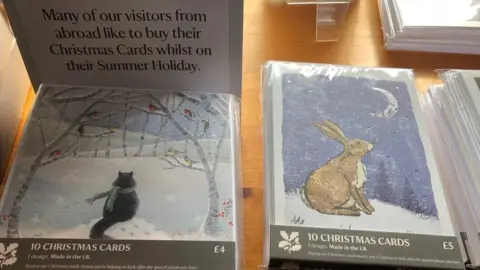 BBC
BBCThe UK greeting card market is worth billions, with Christmas being a major player. But why are snow-scenes being sold at the height of summer - and who is buying them?
For those who feel the festive season has become a slog rather than a celebration, the annual appearance of Christmas cards in the shops in the middle of August may feel like an irritation too far.
Certainly as shops began to deck their displays with boughs of holly, it prompted hundreds of social media comments - many negative.
But why are Christmas cards sold in the summer?
'I would struggle greatly'
 EPA
EPAThe first sign of the jingle-bell juggernaut was condemned by social media users.
User Helen Cotterell described it as "ridiculous", while Angela Heald "stood in the doorway flabbergasted" and Trish Broughton called for a boycott of the shops.
Ian Kirkham summed up the mainly negative reaction with: "It's still the summer hols and ruddy Xmas cards are out already.
"Xmas cards should not go on sale until, at least, November, after the fifth."
 Stacey Burch
Stacey BurchBut Stacey Burch, a single mother from Basford in Nottingham, is one of the exceptions to the unwritten rule, buying cards in August to ease financial worries.
"Seeing Christmas cards in shops gets me excited and it makes me happy because I know I can start preparing for a time of year that is stressful financially," she told the BBC.
"I never leave Christmas shopping until the last minute. I'm constantly looking for bargains all year round. As a single mum of two children, if I didn't do this I would struggle greatly.
"I think it's nice people start Christmas earlier with decorations and the music and selling items.
"I would rather this feeling last a good few months than thinking this is all for one day and then back to normal."

Greeting cards and Christmas
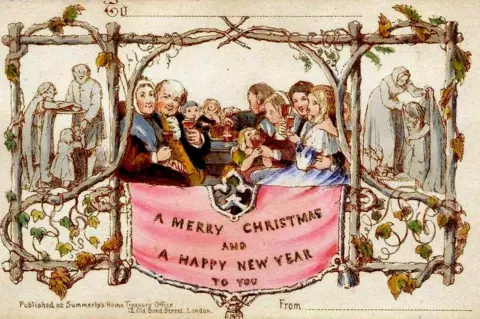 Getty Images
Getty Images- Greeting cards are found in more types of outlet than any other product - with one in six retailers stocking them
- The latest figures show the UK market is worth £1.7bn, with Christmas making up just under half that
- This represents 100 million single and 900 million boxed Christmas cards sold in the UK
- Charities estimate £50m is raised for good causes by charity Christmas cards each year
- The commercial Christmas card (above) was invented in 1846 by Sir Henry Cole, the chief organiser of the Great Exhibition, pioneer of the penny post and founder of the V&A Museum
- One of Sir Henry's first Christmas cards, sent to his grandmother, was recently sold at auction for £22,500
Source: Greeting Card Association

'I like to stock up'
 Getty Images
Getty ImagesAmong the other early Christmas customers are expats who like to buy in their festive tidings during their summer returns to the UK.
Kate Goodger, who lives in Spain during the autumn and winter, said: "I find it very useful to stock up before I go.
"While I can get cards over there, they are much more expensive."

'I make them all by hand'
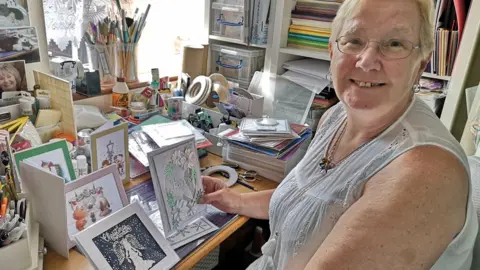 Richard Howells
Richard HowellsChristmas card maker Sheila Howells, from Ilkeston in Derbyshire - who makes cards to support charities - also has an early start.
For her, no sooner has one festive season passed then she starts work on cards for the next one.
"I make them all by hand, so have to start just as soon as Christmas is over," she said.
Ms Howells' cards are sold at coffee mornings and fundraisers from September onwards.
"Last year I made 1,500, so by that time I'd had enough - especially after one of my cats chewed open a bottle of glitter and turned the front room into a winter wonderland," she said.
"Just as everyone else is gearing up for Christmas, I am sitting down for a rest from it."

Beating the discounts
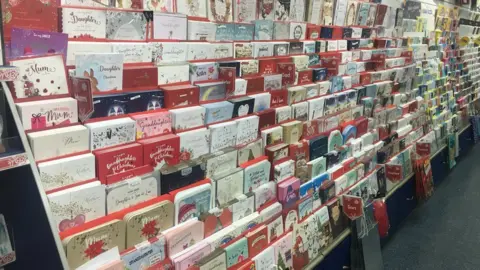
Tourism outlets are among those who like to aim festive greetings at summer visitors.
The National Trust, which runs visitor sites across the UK, said its data suggested people were searching for cards as early as May.
"We stock our Christmas card range to coincide," a spokeswoman said.
"Online sales of Christmas cards in 2018, after the UK, were highest to shoppers in the USA, Germany, France and Canada."
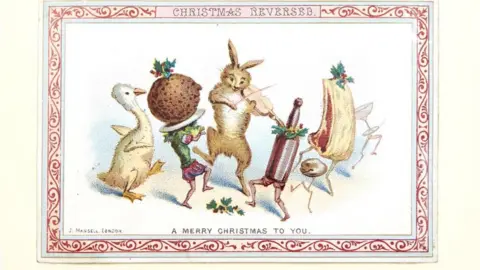 MMU Special Collection
MMU Special CollectionStephanie Boydell, curator of the Special Collections Museum at Manchester Metropolitan University, said outlets like the National Trust had, "a very strong, traditional British branding" that represented "a very particular notion of Britishness".
"I imagine [it] is the same appeal that makes period dramas such as Downton Abbey so popular overseas as well," she said.
Jeremy Corner, who runs luxury card producer Blue-Eyed Sun, said people come to tourist outlets and shops like Harrods and Selfridges in the summer to buy for the following Christmas.
"That means having the cards printed in the early part of the year, which in turns often means designing them before the previous Christmas," he said.
"I don't think people should get too upset over seeing cards in the shops. I'm always in favour of putting a bit more love and care into the world."
 Getty Images
Getty ImagesBranding expert and retail consultant Lou Ellerton said the early marketing is done for two reasons.
"Firstly is to benefit us, the consumer," she said. "It reminds us that Christmas is coming and puts us in the mindset to prepare.
"For large families and those with stretched incomes, it will be a four-month journey to find the best value and get the most from every pound.
"But there is also a benefit to the retailers. Christmas is an incredibly important sales peak and it helps to get in early.
"This means we buy from them instead of competitors and reduces the chance of having to discount stock later on."
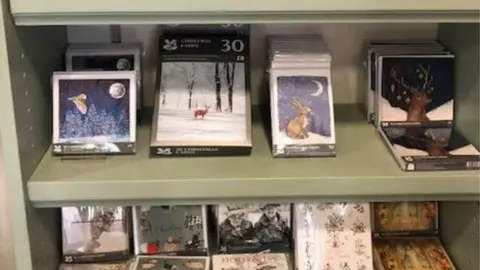
But does the perception that Christmas comes earlier hold true?
"It's a bit like thinking that summers were better when we were younger," said Ms Ellerton. "Despite events like Black Friday and some retailers really pushing early, the big shops still tend to keep Christmas merchandise to after Halloween.
"It doesn't seem to alienate shoppers - perhaps those people who are up in arms about it aren't the kind to shop early anyway.
"The main downside is that, while allowing people to plan, it also brings the pressure early. As soon as the children realise Christmas is on the way, that's when they start to ask for things."

Follow BBC East Midlands on Facebook, Twitter, or Instagram. Send your story ideas to eastmidsnews@bbc.co.uk.
